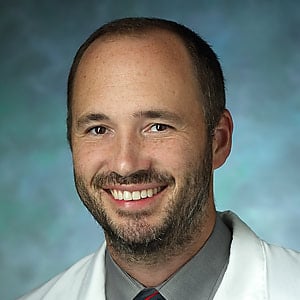Associate Professor of Emergency Medicine
Director of Research, Department of Emergency Medicine
Co-Director of the Center for Data Science in Emergency Medicine
Research Interests:
- Emergency medicine
- Predictive analytics
- Machine learning
- Acute kidney injury
Dr. Jeremiah Hinson is an associate professor of emergency medicine at the Johns Hopkins University School of Medicine. He earned his MD from Albert Einstein College of Medicine in the Bronx, New York and completed an emergency medicine residency at Johns Hopkins. He also holds a PhD in molecular and cellular pathology from the University of North Carolina at Chapel Hill. Hinson is an active emergency medicine clinician, serving as an attending physician in the Emergency Departments of both Johns Hopkins Hospital and Johns Hopkins Bayview Medical Center.
His research interests include emergency department operations, acute kidney injury, and infectious disease. He is particularly focused on the improvement of patient outcomes using data-driven methods. Hinson is a co-director of the Center for Data Science in Emergency Medicine, which includes experts from the fields of biomedical engineering, data science, and mathematical ecology—all focused on the common goal of improving care delivery for emergency department patients. Their team has created important cross-disciplinary partnerships and has developed novel tools that enhance the practice of emergency medicine, including an improved approach to emergency department triage and more accurate identification of risk factors for acute kidney injury. Their team is currently focused on using similar methods to improve infectious disease management in the ED and to predict and prevent acute kidney injury, work for which Hinson has been awarded grants from the Emergency Medicine Foundation and the Agency for Healthcare Research and Quality.
Dr. Hinson is also the director of research for the Emergency Medicine Residency at Johns Hopkins. In this role he oversees research education for emergency physicians in training and has developed a unique longitudinal curriculum that builds skills in evidence-based medicine and research methodology over four years of residency training.
